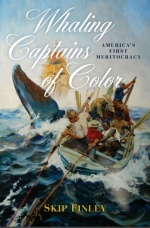Skip Finley — Whaling Captains of Color: America's First Meritocracy
Tuesday, May 256:30—7:30 PMOnlineMain Library28 Arlington Street, Dracut, MA, 01826

Join the Boston Public Library in partnership with the Museum of African American History (MAAH), the State Library of Massachusetts, and American Ancestors New England Historic Genealogical Society (NEHGS) for an online conversation with Skip Finley, author of Whaling Captains of Color: America's First Meritocracy. Priscilla H. Douglas, Chair of the Boston Public Library Board of Trustees, will provide opening remarks for this talk, which is part of the BPL's Repairing America Series.
REGISTRATION IS REQUIRED! Click this link to REGISTER: https://boston-public-library.zoom.us/webinar/register/WN_Q_KO91g9S1yObb2n77Nrtw
About Whaling Captains of Color:
The history of whaling as an industry on this continent has been well-told in books, including some that have been bestsellers, but what hasn’t been told is the story of whaling’s leaders of color in an era when the only other option was slavery. Whaling was one of the first American industries to exhibit diversity. A man became a captain not because he was white or well connected, but because he knew how to kill a whale. Along the way, he could learn navigation and reading and writing. Whaling presented a tantalizing alternative to mainland life.
Working with archival records at whaling museums, in libraries, from private archives and interviews with people whose ancestors were whaling masters, Finley culls stories from the lives of over 50 black whaling captains to create a portrait of what life was like for these leaders of color on the high seas.
Each time a ship spotted a whale, a group often including the captain would jump into a small boat, row to the whale, and attack it, at times with the captain delivering the killing blow. The first, second, or third mate and boat steerer could eventually have opportunities to move into increasingly responsible roles. Finley explains how this skills-based system propelled captains of color to the helm.
The book concludes as facts and factions conspire to kill the industry, including wars, weather, bad management, poor judgment, disease, obsolescence, and a non-renewable natural resource.
Ironically, the end of the Civil War allowed the African Americans who were captains to exit the difficult and dangerous occupation—and make room for the Cape Verdean who picked up the mantle, literally to the end of the industry.
“The story of people of color in the whaling industry is a fascinating and hitherto unexplored subject enough, but Skip Finley’s brilliant survey of the black captains and crew of the New England whale fisheries takes it one step further. His swift and sure narrative is excitingly told, bringing a fresh and vibrant focus to a vital part of American, and indeed global, history.” — Philip Hoare, author of The Whale